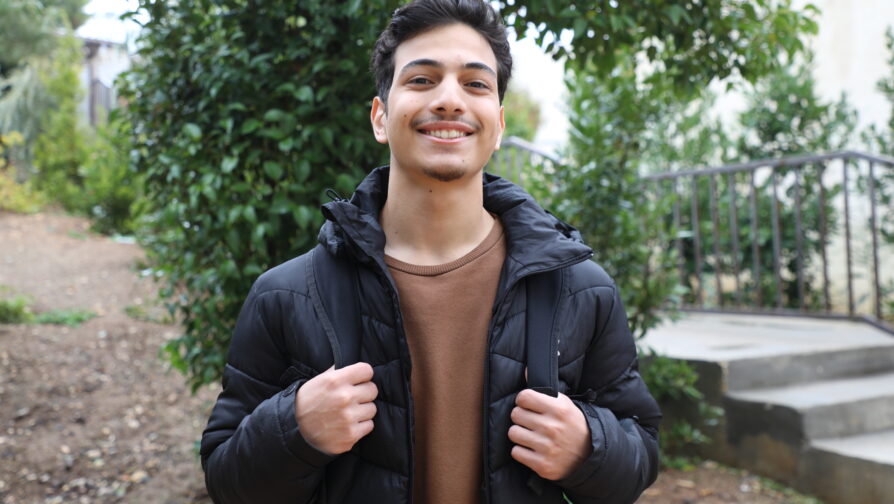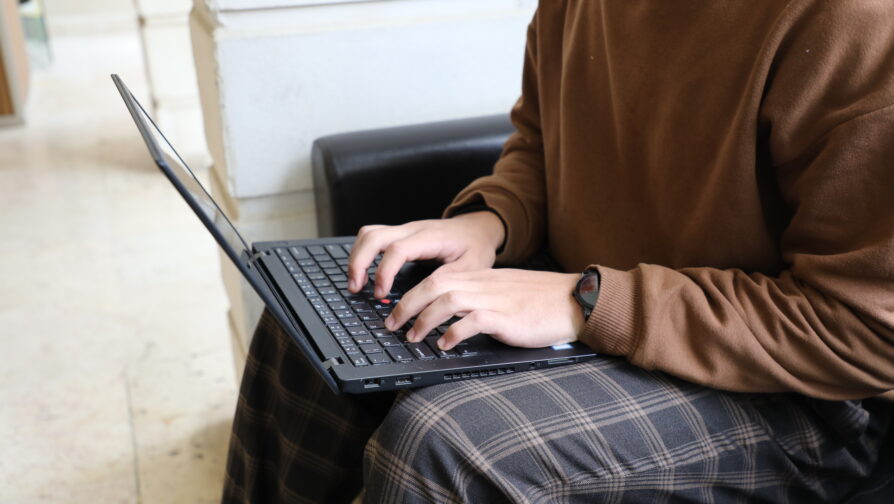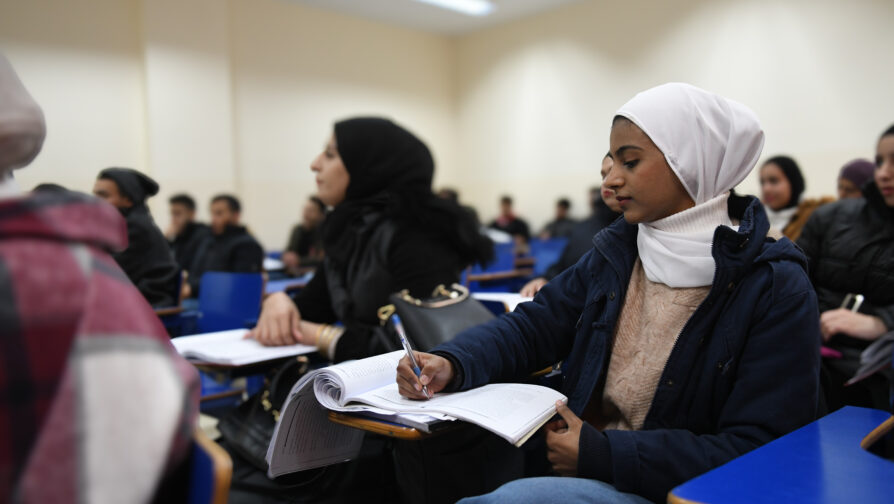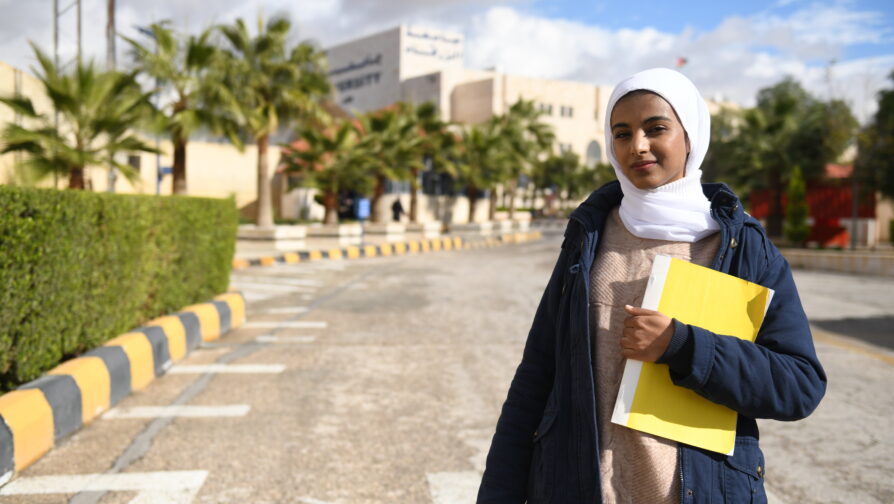How UNHCR helps lower barriers for refugees to get higher education and become active members of society.

Focused on his future in a quiet corner of a bustling campus, Baker maps out his academic journey one page at a time. © UNHCR/Sana Hamdan
“I am beyond happy to have achieved my first goal in life, studying medicine, which was possible because I only had to pay the lower University fees like a Jordanian student rather than the higher ones for international students”, says Baker Al-Obaidi, an 18-year-old Iraqi medical student in Al-Yarmouk University, living in Amman.
Baker’s family fled Iraq in 2005. He was merely a month old, and since then, has not been in Iraq. His journey showcases the transformative impact of higher education on displaced youth.
“I always wanted to study medicine, it is the most humanitarian major, which is what motivated me, specifically after the Covid-19 crisis in which we have witnessed how doctors were on the frontlines to help people”, he explains.
“When I got my acceptance, I was very excited and celebrated with my family, I felt like I was flying that day!”
Baker Al-Obaidi, an 18-year-old Iraqi medical student in Al-Yarmouk University

Baker, embarking on his dream academic journey, radiating joy. © UNHCR/Sana Hamdan
Financial constraints would not have allowed Baker to study his dream major, as University fees represent insurmountable barriers to higher education for him and many refugees.
As higher education is an integral part of UNHCR’s education strategy, aiming to allow youth to realize their future aspirations, the Agency has managed to remove or lower those barriers in recent months. UNHCR-led advocacy has resulted in significant policy changes, including allowing refugee students such as Baker to pay the same rate as Jordanian students in several Jordanian universities. Apart from Al-Yarmouk University which currently hosts more than 100 refugee students, Al Balqa Applied University, Al al-Bayt University and Al Tafileh University have lowered their fees for refugees of all nationalities.

Baker engaged in his studies, with the world at his fingertips. © UNHCR/Sana Hamdan
Islam Massad the President of Yarmouk University explains why his University has lowered fees for all refugees. Their enrollment, he says, serves the surrounding community in Irbid and, in part, the North of Jordan, which hosts a large number of refugees. In addition, helping refugees move towards a better future for themselves and their families “will have a positive impact on society”.
“The university’s vision, goals, and mission align with the decision to lower the fees for refugee students. Yarmouk University believes in diversity, as it is a fundamental and important aspect in any educational institution”, he says. “The presence of students of different nationalities is a qualitative addition to the university.”
In addition to advocating for equal University fees for refugees, UNHCR, the UN Refugee Agency, works on integrating scholarship programmes for refugee students in Jordanian universities, like Edu-Syria and the DAFI (Albert Einstein German Academic Refugee Initiative) scholarship programme.
DAFI offers qualified refugee students the possibility to earn an undergraduate degree in their country of asylum, and the Edu-Syria Scholarship Programme is a project funded by the European Union, aiming to improve the livelihood options of Syrian refugees and vulnerable Jordanian youth through access to higher and vocational education and by improving their chances on the labour market.
“When I got my acceptance, I was very excited and celebrated with my family”, says Baker. “I felt like I was flying that day! This is not just about becoming a doctor, it is a path that will change my life forever – socially, financially, in every way.”
Similarly driven by a passion for education amidst adversity is Sondus Al-Awadhi, an 18-year-old Yemeni refugee born in Jordan. a DAFI student studying Law in Zarqa University.

Amidst a sea of students, Sondus’ commitment to education shines through. © UNHCR/Osama Sabbah
Sondus always dreamed of studying law, “It would have been difficult for me to continue my education if I had not received the scholarship”, she says, “I felt very happy to have been chosen from the many students who applied.”
Enrolling in university marked a pivotal moment for Sondus, “This opportunity will help me become an active member of society and be beneficial not only to myself or my family but to other refugees and all people,” she explains.

Sondus strides through campus with purpose ready to transform knowledge into action. © UNHCR/Osama Sabbah
“UNHCR and its partners are committed to achieving the enrolment of 15 per cent of young refugee women and men in higher education by 2030 through initiatives such as the DAFI programme and EduSyria scholarship”
Zeina Jadaan, UNHCR’s Education Officer in Jordan
The skills learned at primary and secondary school in Jordan form the basis of lifelong learning, which enables refugee children and youth to continually build their knowledge and competencies to survive and thrive in their personal lives, Jadaan explains.
This vision has not yet come true for all refugees. Jadaan indicates that limited and fluctuating scholarship opportunities still hinder the access to higher education for many deserving candidates and that the Global Refugee Forum will be an opportunity for progress.
“We need to see ambitious, multi-partner pledges at the Forum that leverage expertise, innovation and financing to demonstrate actual gains in refugee student enrolment in higher education and greater support for higher education institutions hosting refugees in their first country of asylum”, Jadaan adds.
The Global Refugee Forum will bring together refugees, governments, humanitarian and development actors, faith-based and sports organizations, but also academics from 13 to 15 December. Held in Geneva, it is the world’s largest gathering on refugee issues.
Share on Facebook Share on Twitter